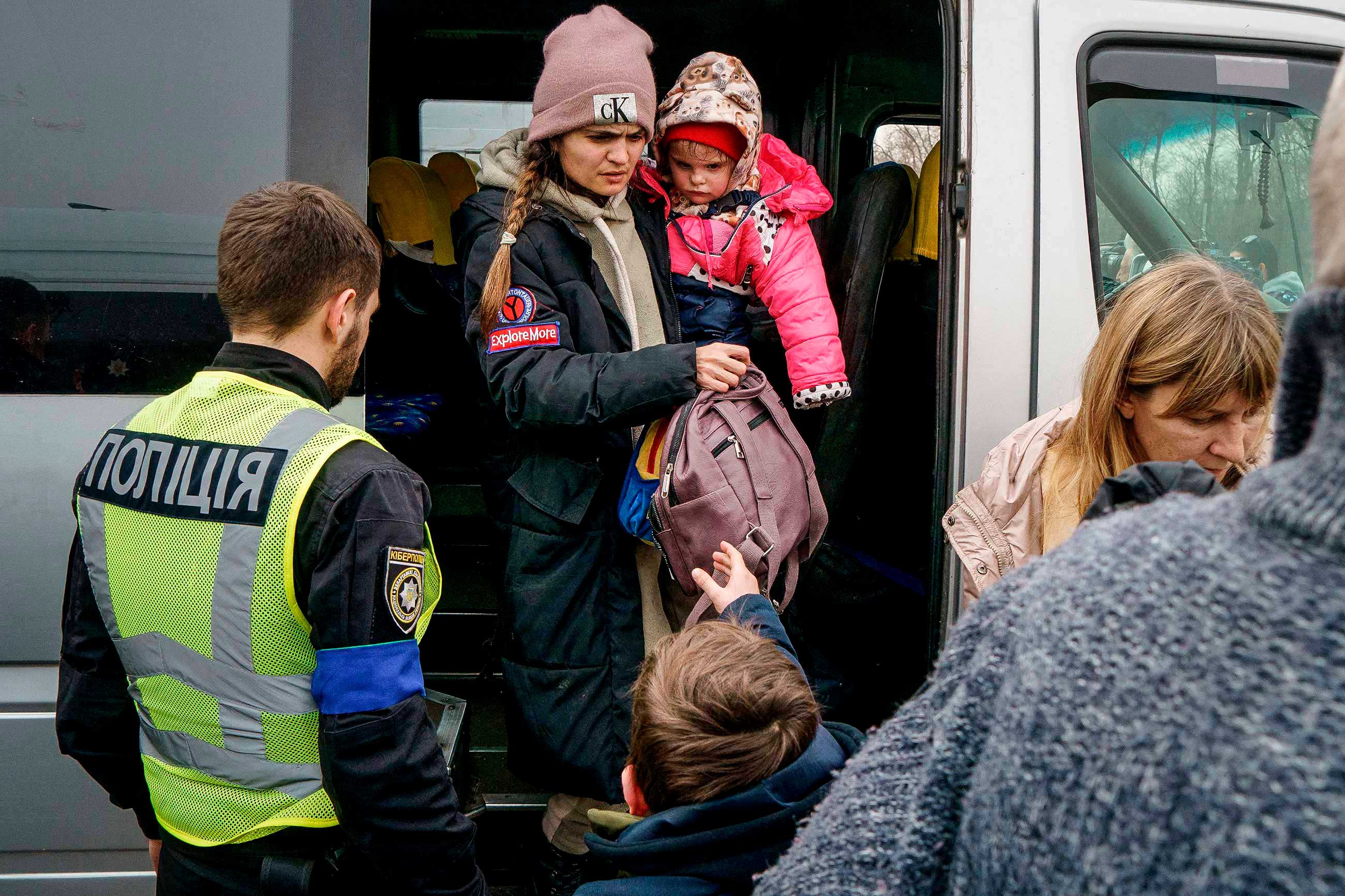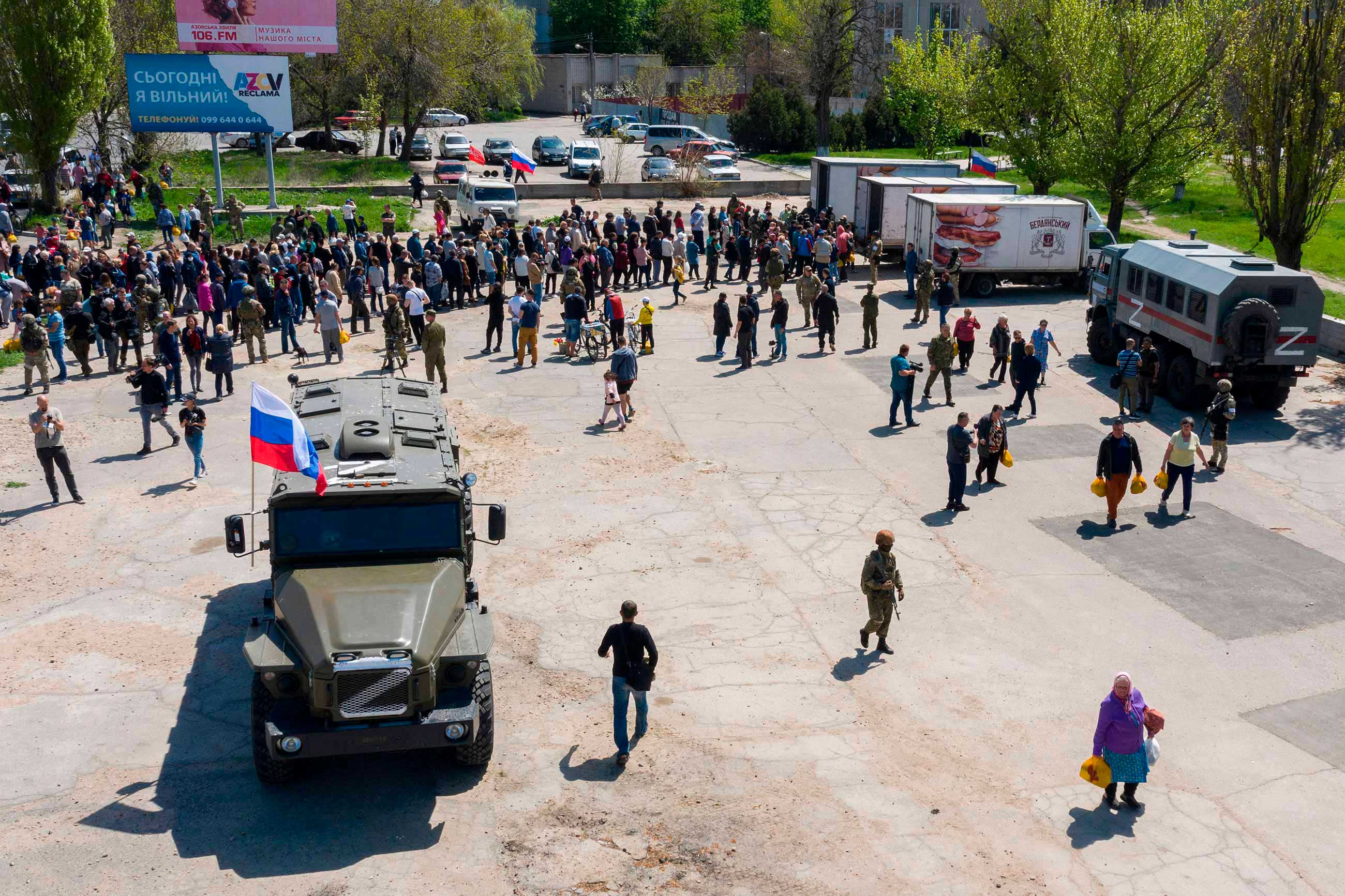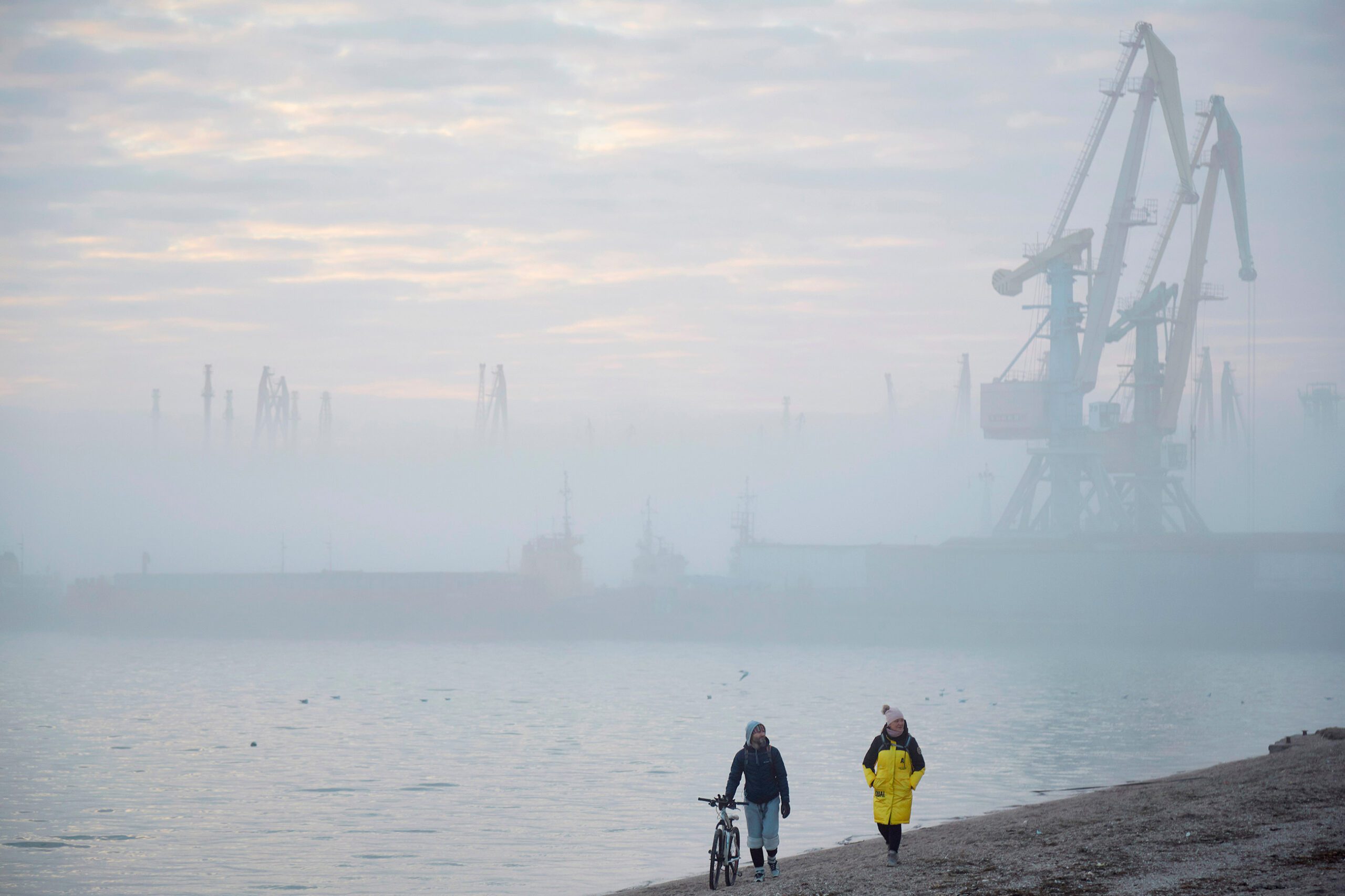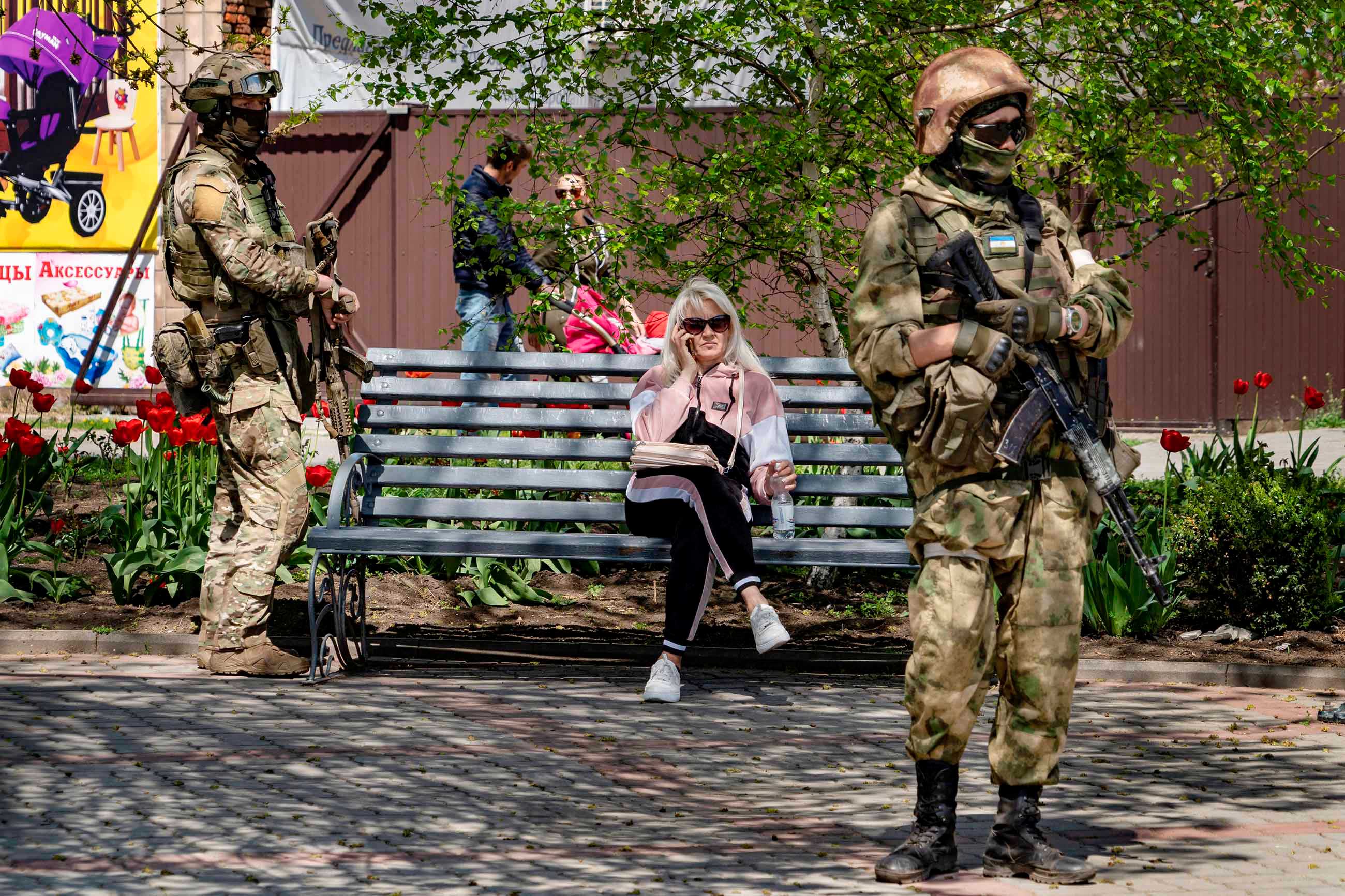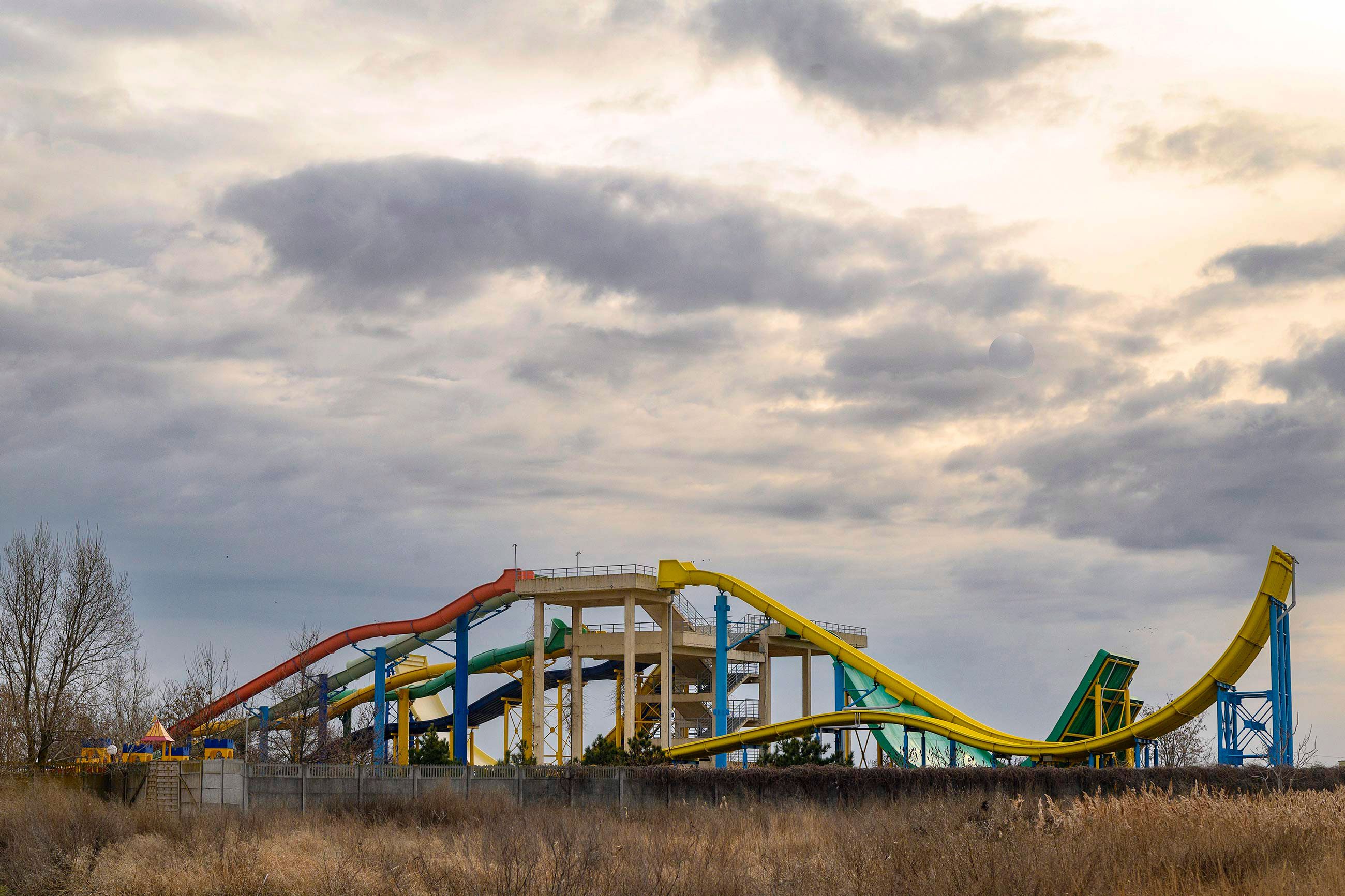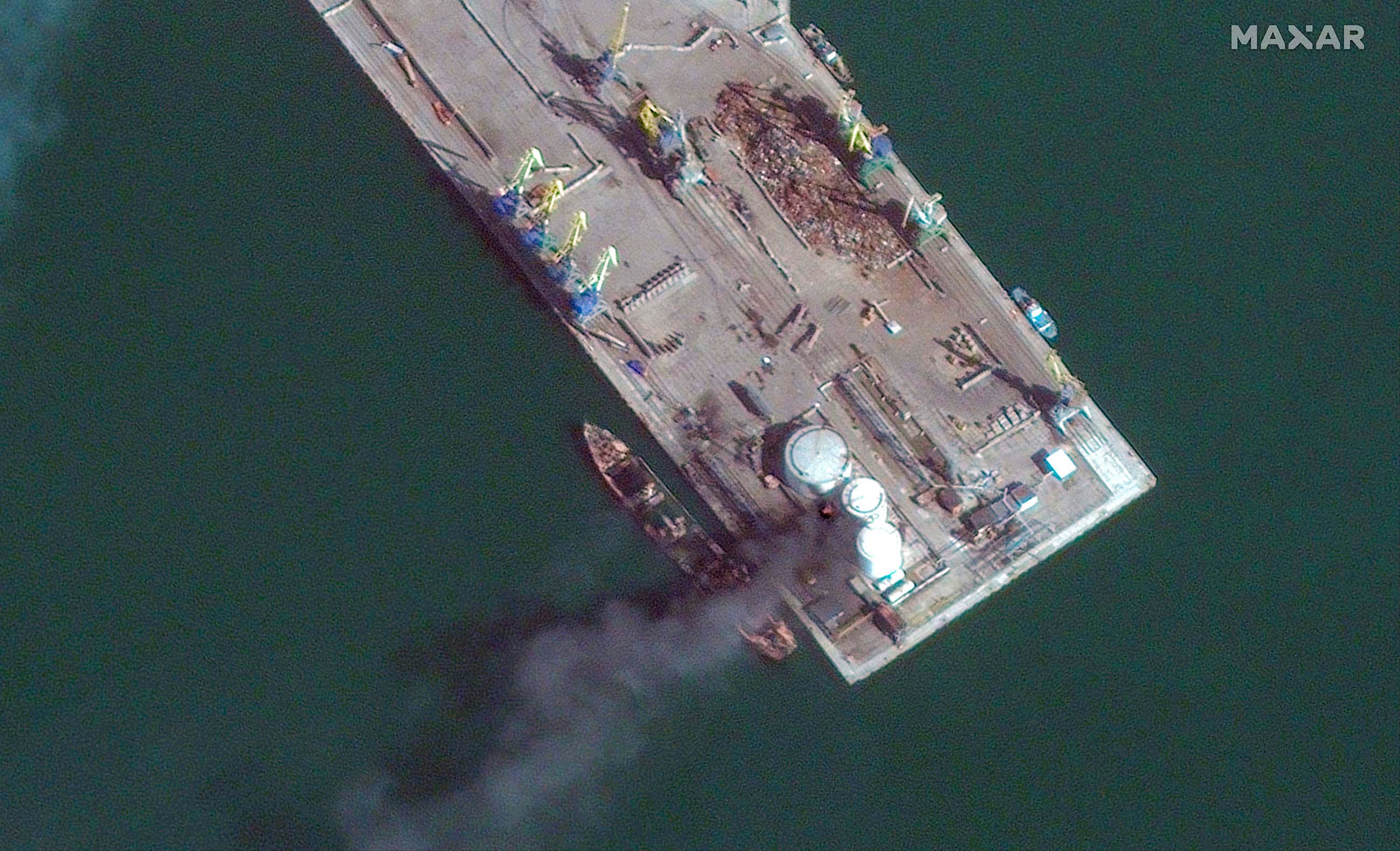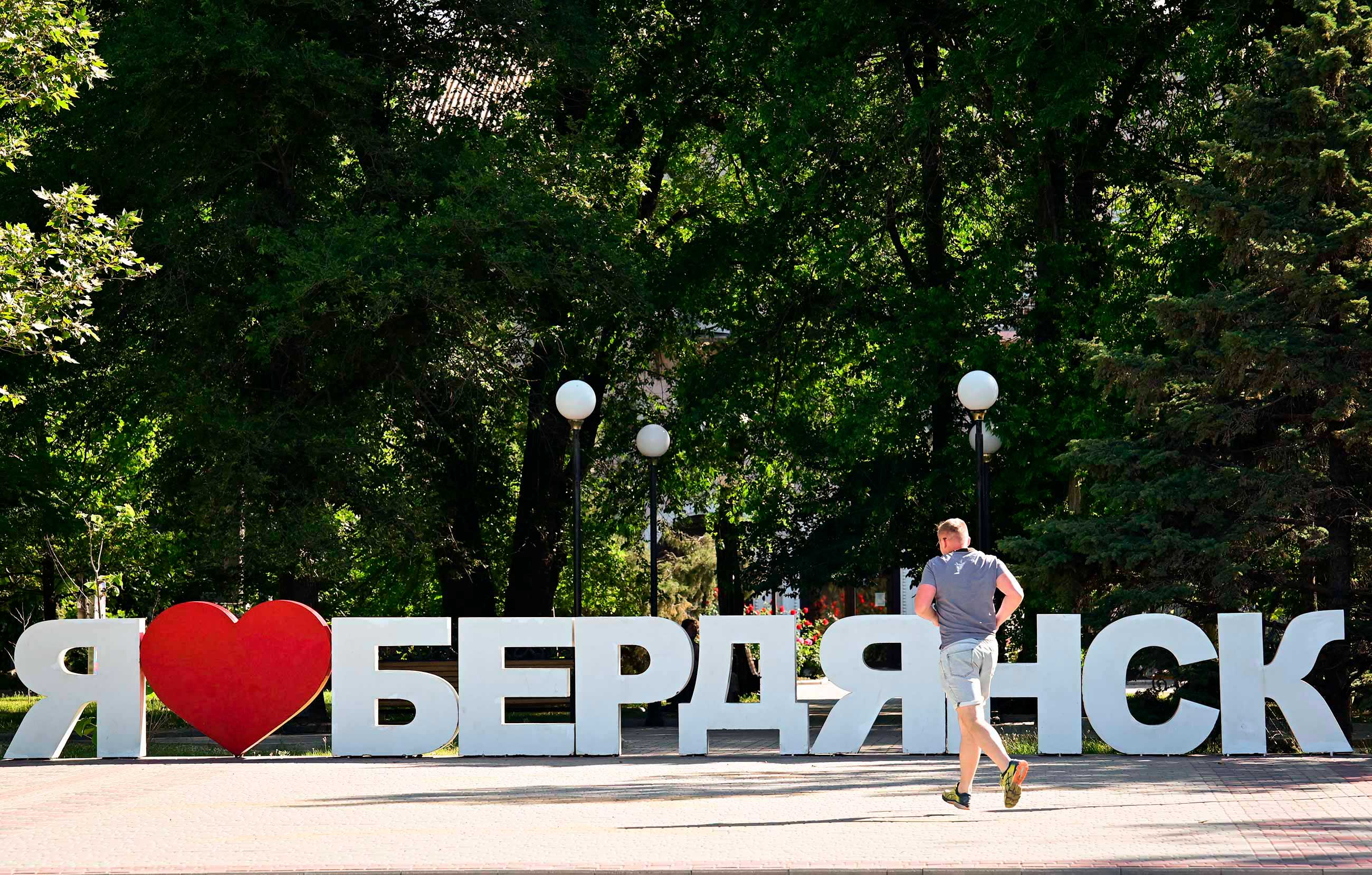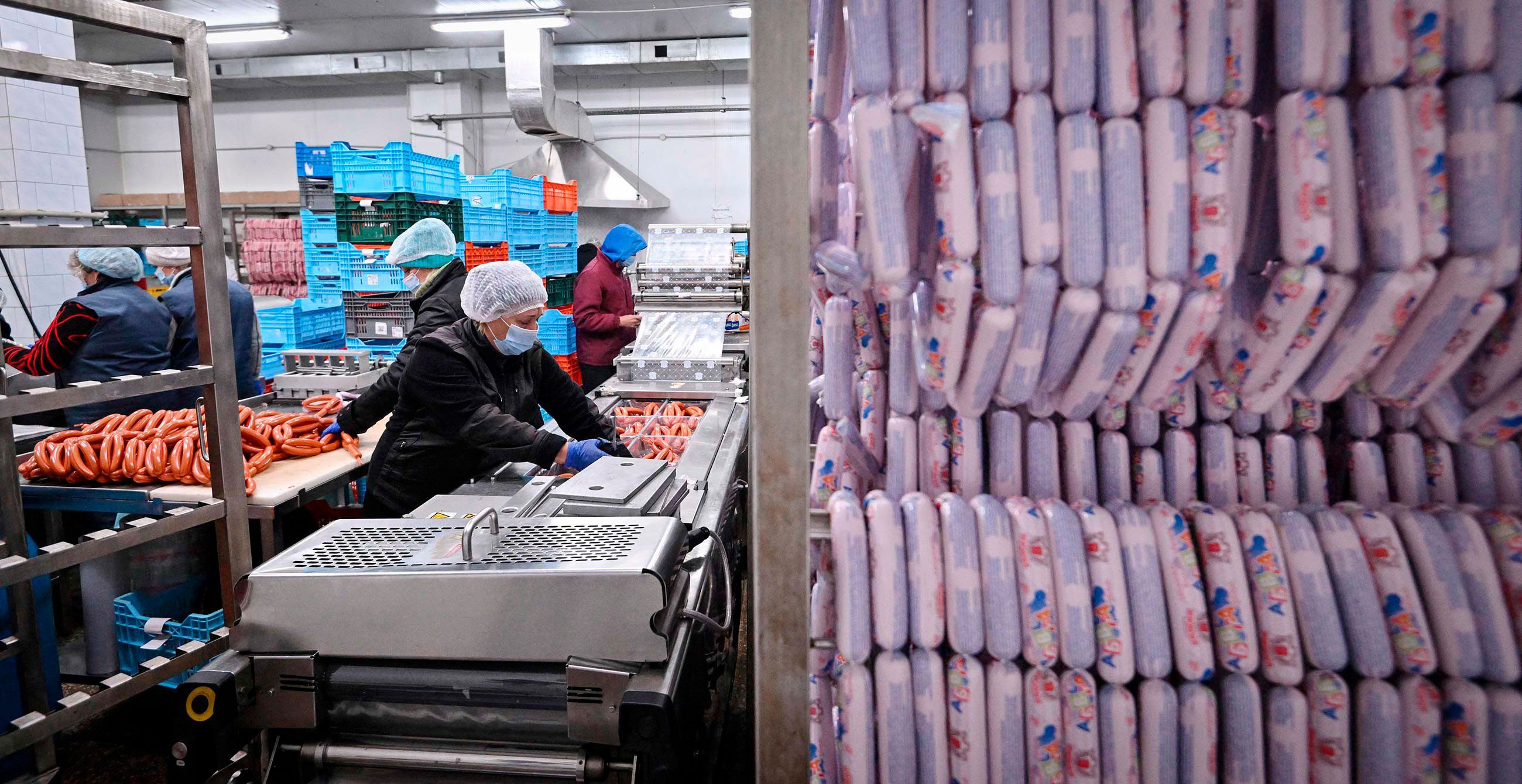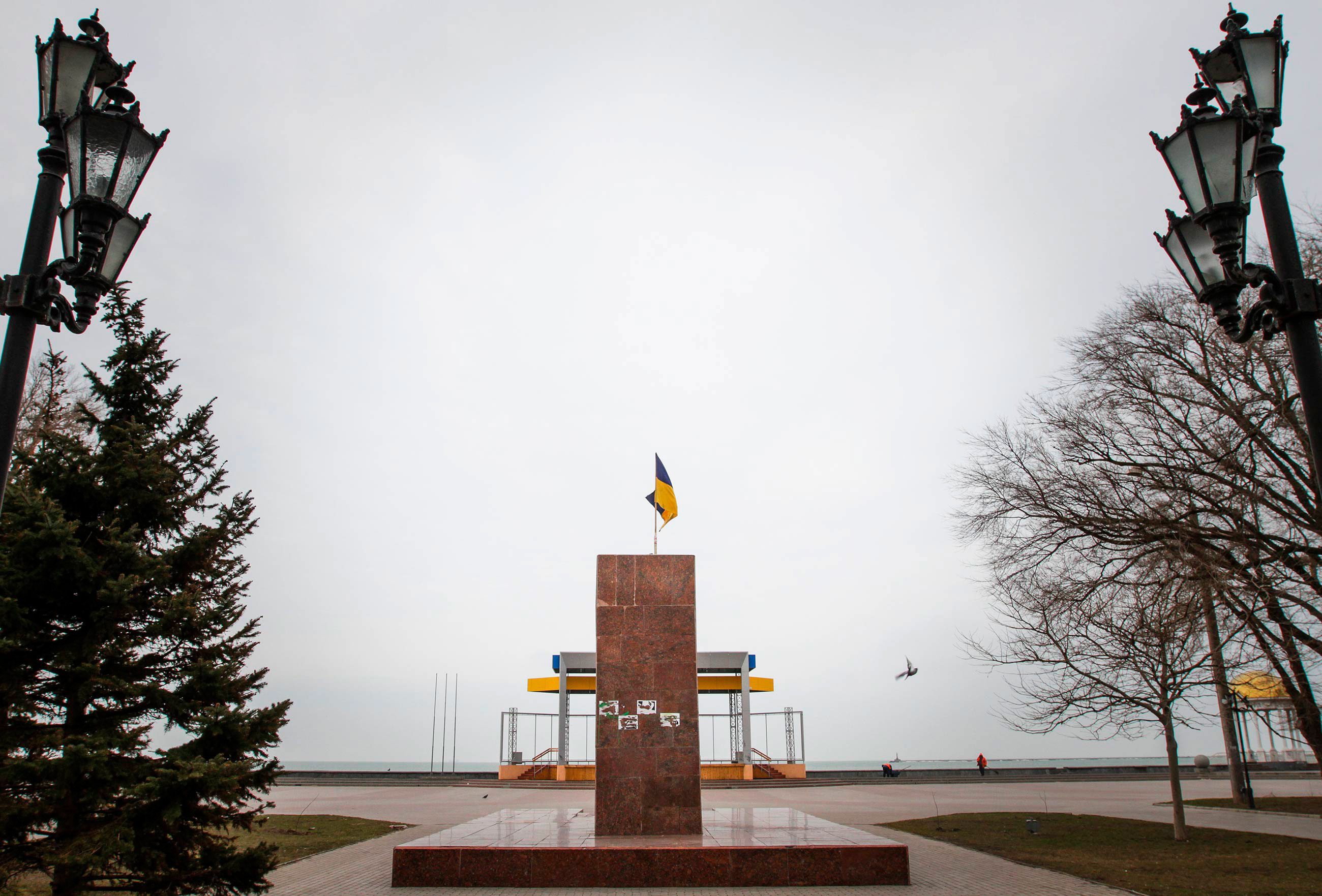“All My Dreams Were Related to Ukraine. They Were Destroyed in One Day.” Three Stories from Berdyansk about Life under Occupation
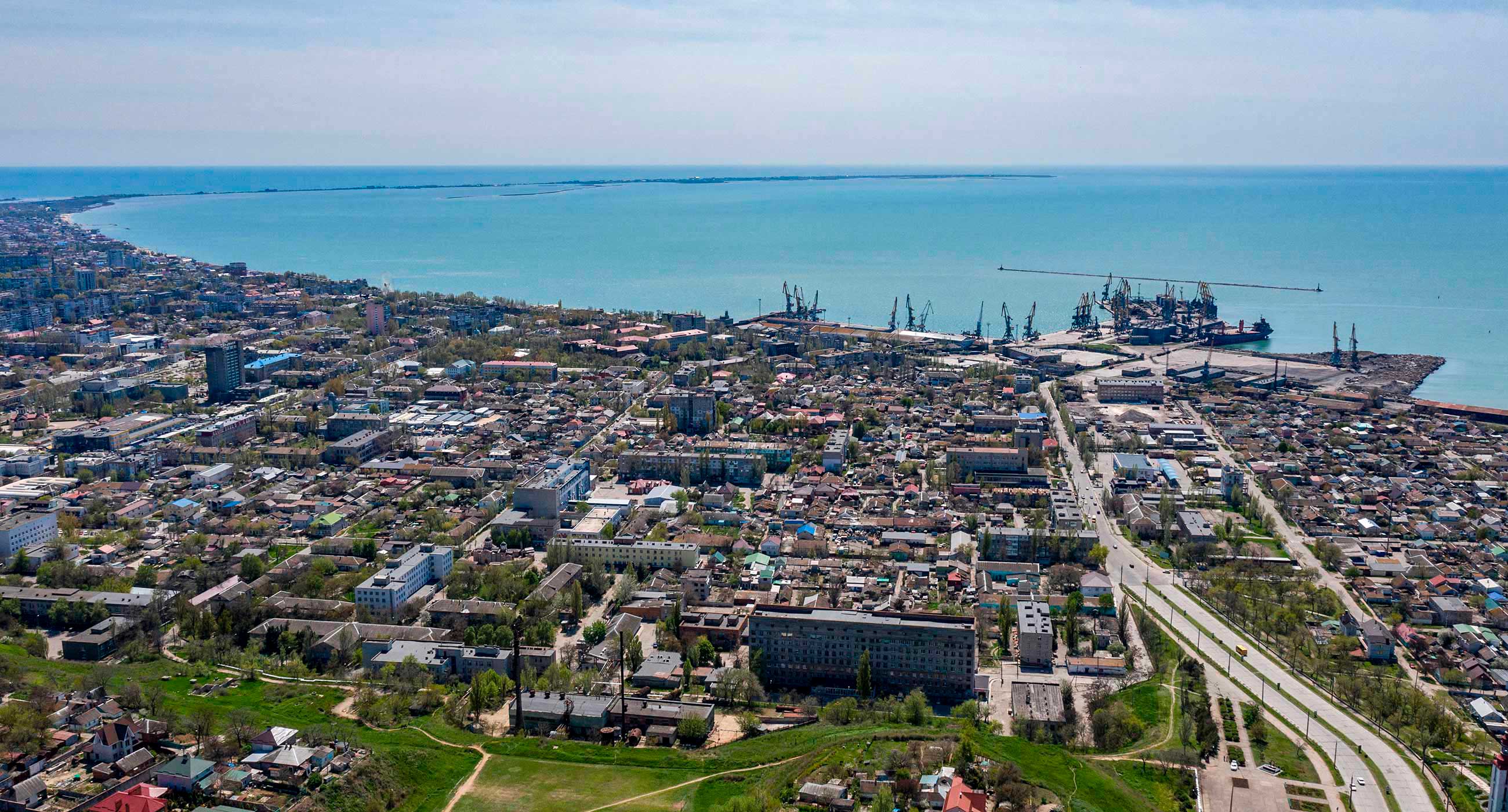
On the evening of February 27, Russian troops entered the city of Berdyansk (Zaporizhzhia region). Since then, the city has been occupied: there is no gas, Ukrainian mobile communications are turned off, and Ukrainian products and medicines are not allowed through. Berdyansk is located on the shore of the Sea of Azov, so the main sources of income for the citizens are tourism and the port. Now neither of these works. Zaborona journalist Polina Vernyhor tells three stories of Berdyansk residents who continue to live in the city. Most people are afraid to speak — they are worried that they can be tapped through the Russian Internet and punished for their pro-Ukrainian position. Therefore, all the names in the article have been changed.
“I’m waiting for the sounds of explosions so that this horror will end soon”
Vladyslav is 54 years old. He stays in Berdyansk because of his mother – she is over 80 years old, and it will be physically challenging for a woman to leave the city. Vladyslav works in a warehouse. When full-scale war broke out on the morning of February 24, he was just finishing his night shift.
“My partner and I have already sat down to rest. Afterward, he ran up with bulging eyes: “Did you hear that?”. It was the first missile hit, but I didn’t hear it. Four more powerful explosions were already heard on the street. We felt an explosive wave,” Vladyslav recalls in a conversation with Zaborona.
In the first days, there was no panic in the city – only long queues appeared at gas stations. Vladyslav’s relatives in Kyiv offered to move to them, but the husband’s mother flatly refused to leave – she said that she could not stand the road and asked not to leave her alone.
“She loves her city, her country house very much. In addition, even the war could not disturb the garden plans: it is the end of winter, and it is necessary to plant soon. She says that she is not afraid of anything anymore, because she survived three wars that were related to our family: World War II, Afghanistan, and the beginning of the war in Donbas,” the man explains.
Vladyslav learned about the entry of Russian troops in one of the local patriotic telegram channels. Two days before the occupation, videos were showing a convoy of Russian vehicles moving towards Berdyansk. On February 25, Vladyslav went to the Military Commissariat to join the Territorial Defense. However, at that moment there was no one in the building, and the doors were locked.
Then the man called the hotline of the command of the Territorial Defense forces, where they offered to get to either Mariupol or Zaporizhzhia on his own. Vladyslav decided to stay in his native Berdyansk.
When Berdyansk was occupied, most of the citizens stayed at home. Local telegram channels reported that on the first day, the Russians shot a man on the street who refused to hand over his phone. Later, the fear subsided a little, and people began to go outside.
-

Evacuees from Berdyansk and several from Mariupol are helped to get off the bus as they arrive at the registration center in Zaporizhzhia. Photo: EMRE CAYLAK / AFP via Getty Images
Once, a friend called Vladyslav and offered to go together to a rally near the Сity Executive Committee building. Activists, priests, and ordinary citizens have been gathering there for several days.
“We walked from the Executive Committee to Primorska Square, sang patriotic songs, shouted Ukrainian slogans. This went on for several weeks. Once I had to miss a rally because I was called to work. It was on that day that the activists were brutally dispersed on Primorska Square. Protesters were knocked to the ground and mercilessly beaten with batons. They beat women and men indiscriminately. After that, the rallies almost stopped. The most active pro-Ukrainian activists began to be kidnapped,” the man recalls.
With the start of the occupation, a crazy hype began in the city – people bought up everything they saw. Today, food and medicines are brought to Berdyansk from Crimea – they are mainly sold in stores. In the markets, people mostly sell what they grow themselves, so Vladyslav buys there.
“Russian herring is 3-4 times more expensive than we bought before the occupation. Russian beer is three times more expensive and much worse in quality. Once I bought a broiler chicken at the store. We cooked it, and it shrunk by half and became like a chick,” the man complains.
There has been no gas in the city since the beginning of the occupation. Last year, gas was cut off in Berdyansk for several months, so even then many people bought electric stoves. Now it has come in very handy. At the beginning of the invasion, the price of electric stoves increased by 5-7 times, many could not afford them or simply did not have time to buy them. Now the price has fallen because Russian-made equipment has appeared. The occupying authorities have halved the price of water for the population – locals are urged to refuse to pay bills to the state, and to bring cash for the utilities to the City Executive Сommittee.
After Ukrainian troops destroyed a Russian ship in the port of Berdyansk on March 24, the occupiers turned off mobile communications in the city for two weeks. At that time, Vladyslav saw Russians running around the city looking for the spotters – they thought that someone had transmitted the coordinates of the Ukrainian military by phone. Later, the connection was turned on, but not for long – now it still appears very rarely. Many people have internet. Some have removed Wi-Fi passwords so that neighbors can use it.
“Somewhere at the beginning of June, some depersonalized Russian connection appeared in the city – it was completely unclear what kind of operator it was. People queued up at points where these cards were issued – two SIMs could be taken with one passport. However, according to the Russian tradition, you can also buy five SIMs without passport data, but it is more expensive,” says Vladyslav. “Recently, it has become impossible to access Privat 24 and Diya apps without a VPN. My friends who bought the cards are extremely dissatisfied with the quality of Russian communication.”
-

Local residents and refugees from the Donetsk region stand in line for humanitarian aid, which is distributed from Russian military trucks in Berdyansk. This picture was taken during a media trip organized by the Russian army. Photo: ANDREY BORODULIN / AFP via Getty Images
It is relatively safe to walk around the city now. Occupation patrols do not harm anyone, but there are cases when young men are taken aside and their tattoos are checked for neo-Nazi symbols. In the first weeks, the occupiers surrounded some houses at night and made rounds. There were also morning rounds: they checked documents and searched for something. Soldiers from the so-called DNR usually go on patrols – now they patrol the city without weapons, or at least do not show them in public. There has not yet been a total inspection of every apartment in the city. Vladyslav feels that there are many times fewer occupiers in the city these days.
There is a PrivatBank branch in Berdyansk, but there are huge queues around the clock because this is the only way to get cash. For 8-15 percent, you can get cash from pawn shops or just from people who sell it on the street. Berdyansk was left without traditional summer earnings. There are very few people at sea, the port is not working, and many have left the city. Especially families with small children left. Also, says the man, some take care of relatives of retirement age or do not have money to move. “After the arrival of the Russian invaders, life “became much easier”. It’s sarcasm if anything. You don’t make plans anymore, you don’t suffer from bad news on the Internet. And you anxiously think: what’s next, how long will it last, how long will you be able to endure all this, how will you survive the winter without heating?” says Vladyslav. “The worst thing is if this occupation is for a long time. You are already waiting for the sounds of explosions, shooting, so that eventually this horror will end. So that you can return to your quiet home, to your peaceful Ukraine.”
-

A couple walks on the beach near the port of Berdyansk on the Sea of Azov, February 16, 2022. Photo: Pierre Crom/Getty Images
“It turns out we were very happy”
Veronika is almost 30 years old – she is a native of Berdyansk. She spent her entire childhood in the city, where she got married and gave birth to a child. There she encountered a full-scale war.
On February 24, Veronika’s family woke up at 4:50 a.m. when the first Russian shells hit Berdyansk, falling on military bases. No one in the local public could clearly explain what was happening. It was hard to believe that the war had started. Everyone was shocked. The family did not even think about evacuating: this idea seemed 100% dangerous.
When the occupiers entered the city, a convoy of enemy vehicles passed by Veronika’s house. The woman admits that she has never seen tanks, armored personnel carriers, and even moving ones. She was very scared. It was scary to go to rallies, and Veronika didn’t see the point: “They won’t leave Berdyansk without an order, and teasing armed people is quite dangerous. The child needs me alive and healthy.”
For the first week, Veronika’s relatives were afraid to leave the house with the child. Only one at a time and quickly they went to the store or the ATM. Today, they sometimes take the child out for a walk, but after sunset, they try not to be outside.
-

Russian servicemen patrol a street in Berdyansk, April 30, 2022. This picture was taken during a media trip organized by the Russian army. Photo: ANDREY BORODULIN / AFP via Getty Images
Now there is a total shortage of food in the city. In March, Veronika’s family ate wheat porridge, which is usually prepared for dogs. Gradually, more goods began to appear: entrepreneurs bought products in nearby Melitopol, and some sold what they bought earlier.
“When humanitarian aid for Mariupol residents began to arrive, foreign goods appeared on the markets. We still sometimes see vegetable oil from Europe, who knows where it is from, because humanitarian oil has not been imported for a long time,” explains the woman to Zaborona. “Now the occupiers allow goods to be imported only from Crimea or LDNR. Almost all our products and medicines are Russian. The exception is Chumak brand products because they are Melitopol products.”
When ATMs stopped working in the city, huge queues appeared at the banks. To get cash, you may stand under the branch all day but never get to the cash register.
All utilities, except gas supply, are working. Only the quality of the water has significantly deteriorated since reagents for purification are not brought into the city. Medicines in Berdyansk are difficult to find, Veronika orders some from Zaporizhzhia. Orders are delivered by carriers for 200 hryvnias. Some can be bought from locals, and in some cases even exchanged for other medicines or products.
The Ukrainian operator Lifecell stopped working in Berdyansk almost immediately with the arrival of the occupiers, Vodafone lasted for a month and a half. Locals used roaming from Kyivstar, but it also disappeared two and a half weeks ago.
“I had to buy Russian SIM cards in order to have a basic opportunity to find out who will be home where, when, and to call an ambulance. But now you have to filter what you talk about because you can be tapped,” says the woman.
It is difficult for Veronika to answer the question of whether she feels that it is safe to walk on the streets. Activists and participants in hostilities were abducted – some are still being held captive. But average residents seem to be unaffected. Previously, patrols stopped men and checked documents, but now there is no such thing.

An amusement park and water slides on the outskirts of Berdyansk, Ukraine, on January 17, 2022. Photo: Christopher Occhicone/Bloomberg via Getty Images
The Russian military, she says, behave politely with the townspeople: they stand in general queues in shops. Veronika believes that they have an order to behave politely so that more Berdiansk citizens loyal to the occupation appear.
Today in the city, everyone survives as best they can. People spend their savings. Someone lives from one social assistance to another, someone rents housing to refugees, and someone has a job, for example, as a driver or salesperson.
Those who still remain in the city, according to Veronika, may be afraid of evacuation. At the beginning of the war, there was a lot of discussion on the Internet about cases when cars were shot or taken at roadblocks. Phones, laptops, and personal belongings are taken from some. Before the war, you could drive from Berdyansk to Zaporizhzhia in three hours. Now this journey can take more than 10 hours, and if there is fighting in Vasylivka [a city located between Berdyansk and Zaporizhzhia], the journey will be delayed for several days.
The main goal, Veronika says, is not to die of hunger. Plans in Berdyansk can be made a maximum of a few days in advance because you never know what awaits you tomorrow or even in an hour.
“We dream of a peaceful life in the future. I am very afraid that we will remain under occupation forever,” the woman admits. “I am afraid that they will bomb us. I am afraid that all this will drag on for a year or more. I miss my life until February 24. It turns out that we were very happy then, although we didn’t notice it ourselves.”

Maxar has collected new satellite images of the southern Ukrainian port city of Berdyansk, showing a Russian Alligator-class landing ship that has burned and partially sunk near one of the port’s loading/unloading berths. Fire and smoke can be seen in and around several fuel storage tanks. According to news and videos on social networks, on March 24, Ukrainian forces hit a ship in the port. Photo: Satellite image (c) 2022 Maxar Technologies
“I refused to eat the products because they are Russian”
Nastia is 15 years old, she is in the eighth grade. In addition to school, she attended a theater studio and dreamed of the Theater faculty of one of the Kyiv universities, but now it is difficult for the girl to imagine how to make these dreams come true.
On February 24, around five in the morning, Nastia and her little brother were woken up by their mother. She asked not to worry and to pack things to go to grandmother. She said that the war had started, and the Russians were bombing the city.
“I started replaying all the fragments in my head. There were many videos on TikTok about the alleged attack the weeks before. I was worried, I think, more than any of my friends – they reassured me, no one believed that this would begin. And here I had all the fragments sharply assembled into a single picture. I started to worry a lot. I did everything my mother said. I didn’t want to be a burden to my loved ones, because then and now, it was very difficult for my parents,” the girl recalls in a conversation with Zaborona.
Nastia’s family went to her grandfather and grandmother because they had a basement in their house. Time passed very quickly there. Nastia wrote one message to everyone she knew: “Hello, how are you? I hope you are doing well.” There was little discussion of the war that day. She wanted to spend more time with loved ones. Nastia sat for several hours, hugging her grandmother – her heart ached very much.
Nastia’s relatives have a fairly active pro-Ukrainian position. Her grandfather even joked that the Russians “will come out as soon as they come in – our guys will give them a hard time.” It was somehow reassuring. The family did not want to leave, because their whole life was in Berdyansk: housing, work, relatives, and friends.
Nastia’s relatives did not go to pro-Ukrainian rallies. Only her mother’s friend was there. She told how the occupiers dispersed the demonstrators, beat them, stripped them in the cold, and put them on concrete slabs.

A man runs past the sign “I love Berdyansk” on the embankment in Berdyansk, amid ongoing Russian military operations in Ukraine, on June 14, 2022. Photo: YURI KADOBNOV / AFP via Getty Images
“We just watched the rallies, but we were afraid to go,” says Nastia. “But there was a strong pride for our Berdiansk people. I was glad to see Ukrainian flags in the city. But this joy faded when I saw that it only helps morally. It did not affect the case physically.”
At the beginning of the occupation, the girl’s parents went to the store one at a time, and if they were late by even 15 minutes than planned, the whole family began to worry. Ukrainian products and medicines were sold out very quickly, and their prices were rising, it seemed, every half hour.
“When I heard the price of sugar and butter, it scared me a lot. I then thought about elders who lived from pension to pension. I imagined how these old people go to the store, how they buy bread and they don’t have enough money for more,” recalls Nastia.
The girl complains that it is unbearably painful and unpleasant for her to see Russian products on store shelves. For a while, Nastia even refused to eat the products that her mother brought from the store: “I wanted to see Ukrainian food all the time so much that I could no longer see these Russian products. I looked at them and just cried,” she explains.

Workers make sausages at the Berdyansk meat processing plant amid Russia’s ongoing invasion of Ukraine, June 14, 2022. Photo: YURI KADOBNOV / AFP via Getty Images
Nastia’s mother worked as a chief accountant. On the first day of the war, she worked in the office for the last time. Then she came to work to pick up some personal things, and February 24 was still on the tear-off calendar. Now the woman misses work very much.
The girl’s father repairs cars – he is a private entrepreneur. So it is easier for him not to pay taxes to the occupiers. He goes to work by bicycle so as not to waste scarce fuel once again. There is little work, but the fact that he has the opportunity to work relieves him a lot and calms him down.
Nastia encountered the occupiers on the street only once. She and a friend were going to the tutor when humanitarian aid from Russia was distributed near the House of Culture. Men stood around the food trucks and looked at the girls. They had weapons, so the girls became scared.
Nastia’s life changed a lot with the arrival of the occupiers. Now, instead of going out with friends, studying at school, clubs, and tutors, she just sits at home. And she is afraid that she will forget her native language because she does not study it at school as before: “I am worried that I am not picking up a book now and I am not studying any rules. Although it’s hard for me to adjust now, but if I want to watch a film, I try to choose the one with Ukrainian dubbing.”
Lessons at the school were transferred to online mode from February 24. After the occupation, classes stopped. Nastia’s classmates tried to support each other in the school chat. Someone was constantly writing something like “Hold on, we’re all one team.” The children were sent on an indefinite vacation, but they never went to study until the end of the school year. Report cards were not issued either – only annual grades were reported.
Most of the teachers at Nastia’s school refused to cooperate with the occupiers. Some of the teachers left for the territory controlled by Ukraine, and some simply resigned. However, Nastia’s parents are convinced that the children will have to be taken out of Berdyansk if the occupation continues for a long time. All through education: children must obtain a Ukrainian certificate and enter a Ukrainian university.
“If the occupation will be long, I will leave in any case. I took my documents from the school because I understand that I do not want to study under this government and I will not. This means a cease of hope for your whole life, for your career – your path to Ukraine and other European countries is closed. We thought and decided that we have only two options: either study online at a Ukrainian school or take me to my relatives in Zaporizhzhia, where I will go to school,” says the girl.
Nastia’s godmother lives in Zaporizhzhia, and the girl could live with her for a while. However, there is a financial problem here: the parents have to somehow provide for their daughter’s accommodation, and it is impossible to withdraw money from Berdyansk, as well as withdraw cash in the required amount.
Nastia dreams that the war will end soon and Ukrainian flags will be hung over the Berdyansk city council again.
“I had dreams, and they were completely related to Ukraine,” she says. “All this just disappeared in one day. It is difficult for me to imagine how I will make these dreams come true if my hometown is occupied. Now my biggest dream is for us to be freed — not by Russians from the Nazis, but by Ukrainians from the Russians. For everything to be as it was before.”
-

The place where the monument to Vladimir Lenin used to stand on the Berdyansk embankment. Photo: Sergii Kharchenko / NurPhoto via Getty Images

